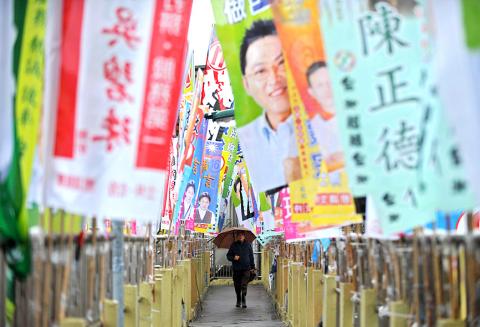Democratic Progressive Party (DPP) Chairperson Tsai Ing-wen (蔡英文) yesterday downplayed recent comments made by a senior party official suggesting that she could be considered as the party’s candidate for the 2012 presidential elections.
Quizzed about DPP Secretary-General Wu Nai-jen’s (吳乃仁) comments at a media briefing on Wednesday, Tsai said that she had made her aims “very clear.”
“I want to be elected Sinbei City mayor and I want to realize my political goals. I want to turn Sinbei City into a first rate [municipality],” she said. “I will be responsible until the end.”

Photo: Patrick Lin, AFP
Wu said the DPP would not exclude any of the five candidates running for mayor tomorrow when it ponders its nomination for the 2012 presidential campaign.
SIMPLE LOGIC
The DPP’s logic was simple, he said. Whoever is the most likely to win a presidential election, “would most likely be our presidential candidate,” he said.
The comments caused Chinese Nationalist Party (KMT) politicians to accuse both Tsai and the DPP’s Taipei City mayoral candidate, Su Tseng-chang (蘇貞昌), of using their municipal campaigns as a springboard to the 2012 presidential election.
Expressing outrage, KMT Sinbei City mayoral candidate Eric Chu (朱立倫) said: “Serving the full term is a basic requirement and a sign of respect for voters.”
KMT Secretary-General King Pu-tsung (金溥聰) yesterday called on voters to understand the intentions of the mayoral candidates and support candidates who were truly committed to the mayorship.
COMMITTED
King said all five KMT candidates would be committed to their voters and finish their four-year terms if elected.
Su dismissed Wu’s comments and pledged his commitment.
“I don’t know what Secretary-General Wu said, but I have already promised Taipei City residents that I will finish my four-year term if elected,” said Su, who has repeatedly denied that it is his intention to join the presidential race as the DPP’s candidate in 2012.

DAREDEVIL: Honnold said it had always been a dream of his to climb Taipei 101, while a Netflix producer said the skyscraper was ‘a real icon of this country’ US climber Alex Honnold yesterday took on Taiwan’s tallest building, becoming the first person to scale Taipei 101 without a rope, harness or safety net. Hundreds of spectators gathered at the base of the 101-story skyscraper to watch Honnold, 40, embark on his daredevil feat, which was also broadcast live on Netflix. Dressed in a red T-shirt and yellow custom-made climbing shoes, Honnold swiftly moved up the southeast face of the glass and steel building. At one point, he stepped onto a platform midway up to wave down at fans and onlookers who were taking photos. People watching from inside

A Vietnamese migrant worker yesterday won NT$12 million (US$379,627) on a Lunar New Year scratch card in Kaohsiung as part of Taiwan Lottery Co’s (台灣彩券) “NT$12 Million Grand Fortune” (1200萬大吉利) game. The man was the first top-prize winner of the new game launched on Jan. 6 to mark the Lunar New Year. Three Vietnamese migrant workers visited a Taiwan Lottery shop on Xinyue Street in Kaohsiung’s Gangshan District (崗山), a store representative said. The player bought multiple tickets and, after winning nothing, held the final lottery ticket in one hand and rubbed the store’s statue of the Maitreya Buddha’s belly with the other,

Japan’s strategic alliance with the US would collapse if Tokyo were to turn away from a conflict in Taiwan, Japanese Prime Minister Sanae Takaichi said yesterday, but distanced herself from previous comments that suggested a possible military response in such an event. Takaichi expressed her latest views on a nationally broadcast TV program late on Monday, where an opposition party leader criticized her for igniting tensions with China with the earlier remarks. Ties between Japan and China have sunk to the worst level in years after Takaichi said in November that a hypothetical Chinese attack on Taiwan could bring about a Japanese

‘COMMITTED TO DETERRENCE’: Washington would stand by its allies, but it can only help as much as countries help themselves, Raymond Greene said The US is committed to deterrence in the first island chain, but it should not bear the burden alone, as “freedom is not free,” American Institute in Taiwan Director Raymond Greene said in a speech at the Institute for National Defense and Security Research’s “Strengthening Resilience: Defense as the Engine of Development” seminar in Taipei yesterday. In the speech, titled “Investing Together and a Secure and Prosperous Future,” Greene highlighted the contributions of US President Donald Trump’s administration to Taiwan’s defense efforts, including the establishment of supply chains for drones and autonomous systems, offers of security assistance and the expansion of